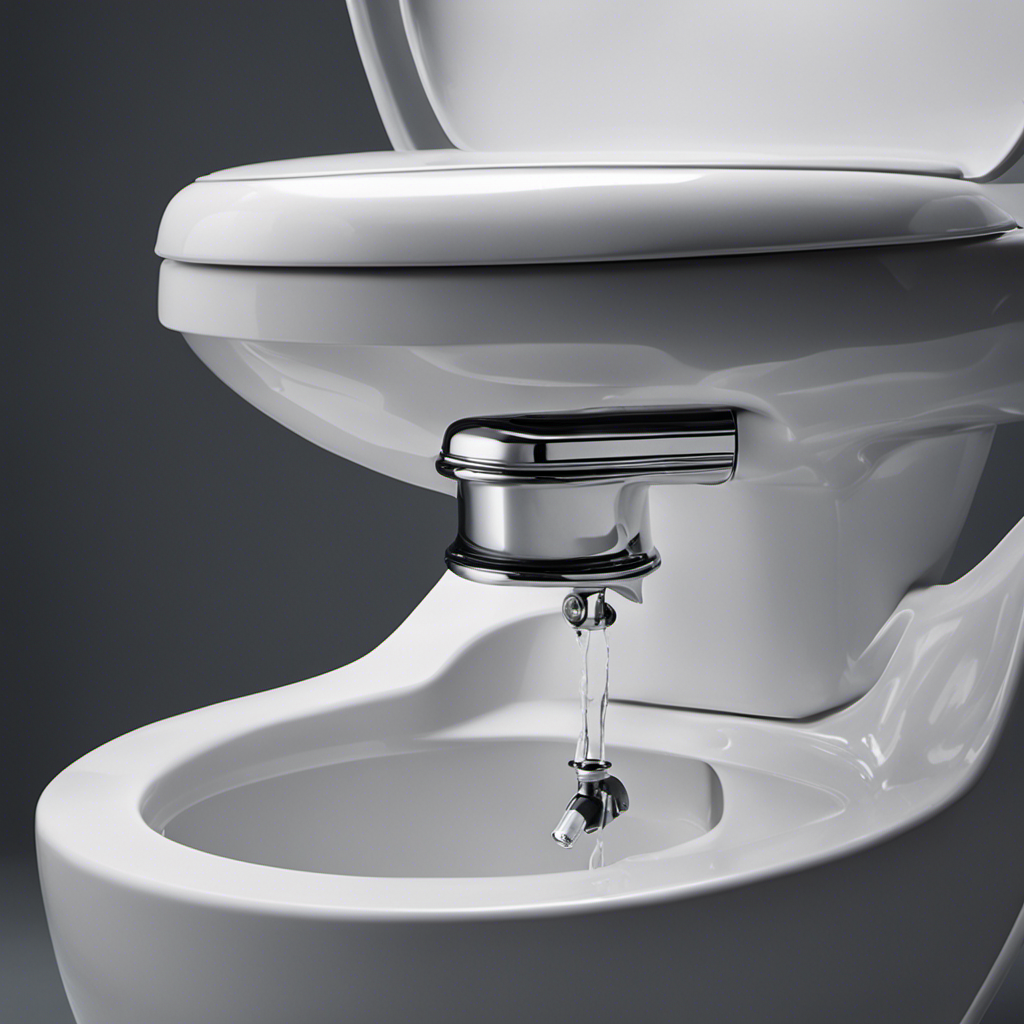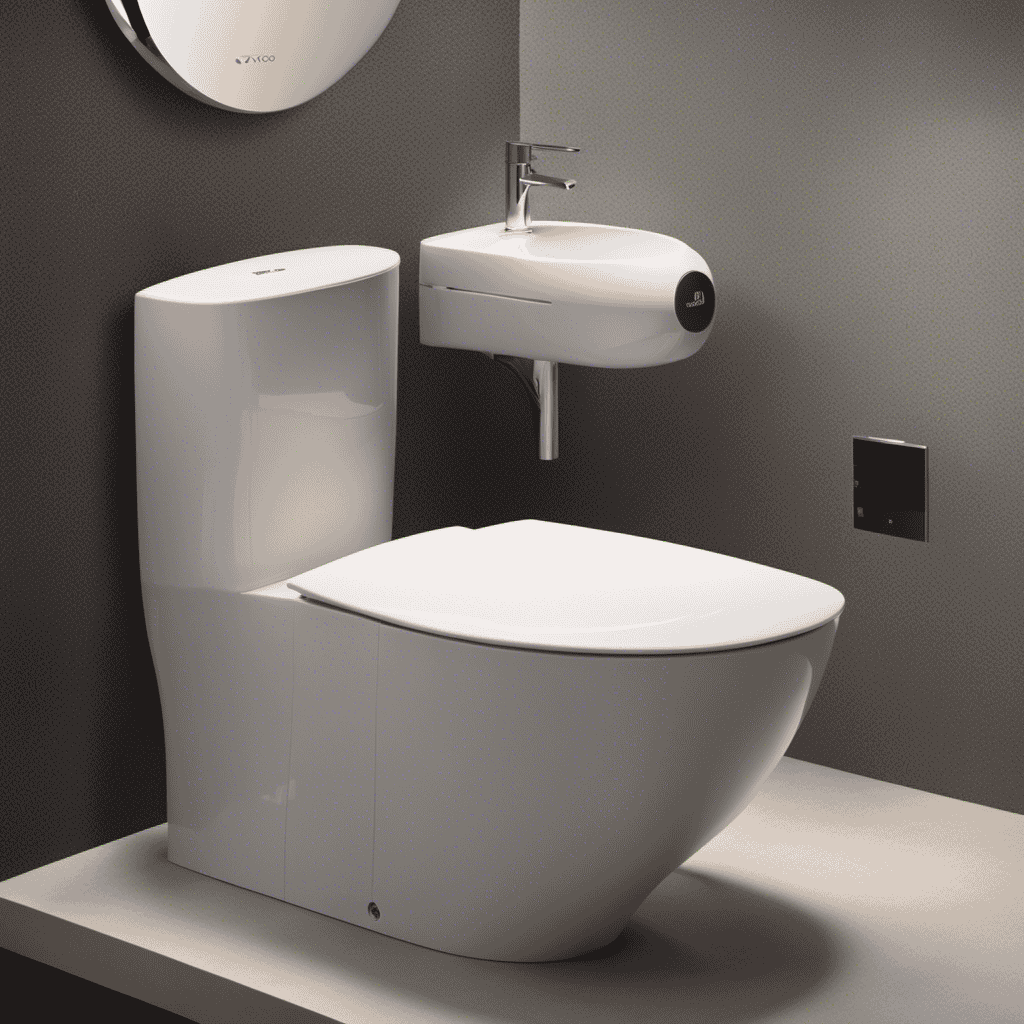Hey there! Ever had that annoying problem of a running toilet? Well, I’ve got your back!
In this article, I’m going to walk you through the steps to stop that toilet from running and save you from wasting precious water and money.
We’ll cover everything from the possible causes of the issue to the tools you’ll need and the common mistakes to avoid.
So, let’s dive in and fix that pesky running toilet once and for all!
Key Takeaways
- Possible causes of a running toilet include a faulty flapper valve, worn-out fill valve, cracked toilet tank or bowl, and loose or damaged water supply line.
- Tools needed to fix a running toilet include an adjustable wrench, screwdriver, plunger, bucket, and pliers.
- Common issues to troubleshoot when dealing with a running toilet include a faulty fill valve, stuck or faulty float, and problems with the flapper valve.
- Steps to stop a toilet from running include inspecting and replacing the flapper valve, adjusting the chain length, and cleaning the valve and surrounding area if necessary.
Possible Causes of a Running Toilet
One possible cause of a running toilet is a faulty flapper valve. The flapper valve controls the flow of water from the tank to the bowl. When it doesn’t work properly, water can continuously leak into the bowl, causing the toilet to run.
Other causes of toilet leaks include a worn-out fill valve, a cracked toilet tank or bowl, or a loose or damaged water supply line.
Signs of a running toilet include a constant sound of running water, water constantly flowing into the bowl, and a higher than usual water bill.
To fix a faulty flapper valve, you can simply replace it with a new one. This is a relatively easy and inexpensive task.
Tools You’ll Need to Fix a Running Toilet
When it comes to fixing a running toilet, having the right tools is essential. In order to troubleshoot common issues and successfully repair the toilet, there are a few key tools that you’ll need.
In this discussion, I will go over the essential repair tools and provide tips for troubleshooting common problems that may arise.
Essential Repair Tools
To stop the toilet from running, you’ll need a few essential repair tools. It’s always a good idea to have these tools on hand in case of plumbing emergencies or toilet tank leaks. Here are the tools you’ll need:
| Tools | Purpose |
|---|---|
| Adjustable wrench | Used to tighten or loosen nuts and bolts |
| Screwdriver | To remove and replace screws |
| Plunger | Helps to clear clogs in the toilet |
| Bucket | Collects water during repairs or cleaning |
| Pliers | Useful for gripping and turning bolts |
| Toilet flapper | Replaces a faulty or worn-out flapper |
These tools will enable you to tackle most common toilet issues. Remember to turn off the water supply before starting any repairs. With the right tools and a little know-how, you can easily fix a running toilet and prevent any further water wastage.
Troubleshooting Common Issues
If the toilet continues to run after you’ve replaced the flapper, it could be a sign of a different issue. While the flapper is a common culprit for a running toilet, there are other components that can cause this problem.
One possible issue is a faulty fill valve. This is the mechanism responsible for refilling the tank after each flush. If the fill valve is not functioning properly, it may continuously allow water to flow into the tank, causing the toilet to run.
Another common problem is a stuck or faulty float. The float is what regulates the water level in the tank. If it is not rising and falling correctly, it can lead to a constantly running toilet.
To fix these issues, you can try adjusting or replacing the fill valve or float. These toilet repair techniques should help resolve common toilet flushing issues and stop the toilet from running.
Step-by-Step Guide to Stop a Toilet From Running
The first thing you’ll want to do is check the flapper valve for any signs of damage or debris. This valve is responsible for controlling the flow of water from the tank to the bowl. If it is not sealing properly, it can result in toilet water leakage and a running toilet.
Here is a step-by-step guide to stop a toilet from running:
- Lift the toilet tank lid and locate the flapper valve.
- Inspect the flapper valve for any cracks, tears, or buildup of mineral deposits.
- Clean the valve and the surrounding area if necessary.
- If the flapper valve is damaged, replace it with a new one.
- Adjust the chain length connecting the flush handle to the flapper valve if it is too loose or too tight.
- Test the toilet by flushing it and observe if the running has stopped.
Common Mistakes to Avoid When Fixing a Running Toilet
Now that we’ve covered the step-by-step guide to stop a toilet from running, let’s discuss some common mistakes to avoid when fixing a running toilet. It’s important to be aware of these pitfalls to save yourself time and frustration. Here are some discussion ideas and troubleshooting techniques to keep in mind:
| Common Repair Mistakes | Troubleshooting Techniques |
|---|---|
| Forgetting to turn off the water supply before starting the repair | Always shut off the water supply by turning the valve clockwise. |
| Not properly diagnosing the issue | Take the time to identify the root cause of the problem. Is it a faulty flapper, fill valve, or water level adjustment? |
| Incorrectly installing replacement parts | Follow the manufacturer’s instructions and double-check your work to ensure everything is properly installed. |
| Ignoring small leaks | Even a small leak can waste a significant amount of water over time. Address any leaks promptly to prevent further damage. |
| Neglecting regular maintenance | Regularly check and clean the toilet components to prevent future issues and prolong the lifespan of your toilet. |
Troubleshooting Tips for a Running Toilet
To troubleshoot a running toilet, start by checking the flapper for any signs of wear or damage. The flapper is a rubber or plastic valve that controls the flow of water from the toilet tank into the bowl. If it’s worn or damaged, it may not create a proper seal, leading to water leakage and a constantly running toilet.
Here are three key steps to troubleshoot a running toilet:
-
Inspect the flapper: Look for cracks, tears, or disintegration. If you notice any damage, it’s time to replace the flapper.
-
Adjust the water level: Check the water level in the tank and ensure it’s at the appropriate level marked on the inside of the tank. If it’s too high, it may cause the toilet to continuously run.
-
Check the fill valve: Ensure the fill valve is functioning properly. If it’s faulty, it may need to be replaced to stop the toilet from running.
How to Adjust the Fill Valve to Stop a Toilet From Running
By adjusting the fill valve, you can prevent a toilet from continuously running. The fill valve is responsible for refilling the tank after each flush. When it malfunctions, it can cause water to continuously flow into the tank, leading to a running toilet.
To adjust the fill valve, start by locating the water supply valve behind the toilet and turn it off. Remove the tank lid and locate the fill valve, which is usually located on the left side of the tank. Use a screwdriver or pliers to turn the adjustment screw on the fill valve clockwise to decrease the water level or counterclockwise to increase it.
Test the toilet by flushing it and check if the running has stopped. If not, further adjustments may be necessary or you may need to replace the fill valve.
These simple toilet repair tips can save you from wasting water and money on a continuously running toilet.
Additional Tips to Prevent a Toilet From Running Again
When it comes to maintaining a well-functioning plumbing system, having a checklist can be incredibly helpful. A plumbing maintenance checklist ensures that you don’t overlook any important tasks. Some of these tasks include checking for leaks, inspecting pipes for corrosion, and cleaning out drains.
However, it’s important to be aware of common toilet repair mistakes that can easily be made. Some of these mistakes include using too much force when tightening bolts or overusing chemical cleaners that can damage the pipes.
Plumbing Maintenance Checklist
Regular plumbing maintenance can help prevent issues like a running toilet. By following these plumbing maintenance tips, you can keep your toilet functioning properly and avoid costly repairs.
-
Check for leaks: Look for any signs of water leaks around your toilet, such as water stains or dampness on the floor. Addressing leaks promptly can prevent further damage and potential running toilet issues.
-
Inspect the flapper: The flapper is a rubber valve that controls the flow of water from the tank to the bowl. Check for any wear or damage and replace if necessary to prevent water from continuously running.
-
Clean the tank: Over time, mineral deposits and debris can accumulate in the toilet tank, affecting its performance. Regularly clean the tank to ensure proper flushing and prevent a running toilet.
Common Toilet Repair Mistakes
When it comes to common toilet repair mistakes, two issues that often arise are faulty toilet flappers and incorrect water level adjustment. The toilet flapper is a rubber valve that controls the flow of water from the tank to the bowl. Over time, it can wear out or become misaligned, causing water to continuously leak into the bowl and resulting in a running toilet. Replacing the flapper is a simple fix that can be done by following a few steps. Another mistake people make is not adjusting the water level properly. If the water level is too high, it can spill into the overflow tube and cause the toilet to run. By adjusting the water level to the recommended height, you can prevent this issue and ensure your toilet functions properly.
Toilet repair mistakes are common, but they can easily be avoided by addressing the issues of toilet flapper replacement and water level adjustment. Here is a helpful table to guide you through these repairs:
| Common Toilet Repair Mistakes | Solutions |
|---|---|
| Faulty toilet flapper | Replace the flapper by following these steps: 1. Turn off the water supply to the toilet. 2. Remove the old flapper. 3. Install the new flapper. 4. Turn on the water supply and check for leaks. |
| Incorrect water level adjustment | Adjust the water level by following these steps: 1. Locate the water level adjustment screw or valve. 2. Turn the screw or valve clockwise to lower the water level or counterclockwise to raise it. 3. Flush the toilet and check the water level. Repeat the process until the desired level is reached. |
Conclusion
In conclusion, fixing a running toilet can be a frustrating task, but it can be easily accomplished with the right tools and knowledge. By following the step-by-step guide and avoiding common mistakes, you can save water and prevent any future issues.
Remember to troubleshoot and adjust the fill valve if needed. Implement additional tips to maintain a properly functioning toilet. Take charge of your plumbing problems and triumph over the troublesome toilet trouble!










